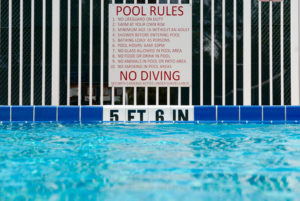Be Smart and Stay Safe: A Water Safety Guide
With its extensive coastline, numerous lakes, rivers, and abundant recreational opportunities, Florida is a haven for water enthusiasts. However, enjoying Florida’s waters comes with its risks, including drowning, boating accidents, and marine life encounters. Below, our personal injury attorney offers essential information and tips for ensuring water safety in Florida, whether you’re swimming, boating, or participating in other water-related activities.
1. Understanding Water Risks in Florida
Florida’s diverse aquatic environments present various risks to water enthusiasts. These risks include:
- Drowning: Florida consistently ranks among the states with the highest number of drowning deaths, especially among children and tourists.
- Rip currents: Florida’s beaches are susceptible to rip currents, powerful currents that can quickly carry swimmers away from shore.
- Boating accidents: Florida leads the nation in boating accidents and fatalities due to its extensive waterways and boating activity.
- Marine life encounters: Swimmers and boaters may encounter marine life such as jellyfish, sharks, and alligators, posing potential hazards.
2. Practicing Water Safety Basics
Whether swimming, boating, or engaging in other water activities, adhering to basic water safety principles is essential. These include:
- Supervising children: Always supervise children around water and designate a responsible adult to watch them at all times.
- Swimming abilities: Ensure that everyone participating in water activities knows how to swim and is comfortable in the water.
- Life jackets: Wear properly fitted U.S. Coast Guard-approved life jackets while boating or participating in water sports.
- Alcohol avoidance: Avoid consuming alcohol before or during water activities, as it impairs judgment and coordination, increasing the risk of accidents.
- Knowing the environment: Familiarize yourself with the water conditions, weather forecasts, and any potential hazards before entering the water.
3. Swimming Safety
Swimming in Florida’s pools, lakes, rivers, and beaches requires vigilance and caution. Follow these tips for safe swimming:
- Swim in designated areas supervised by lifeguards whenever possible.
- Learn how to recognize and escape rip currents by swimming parallel to the shore until you’re out of the current, then swimming back to shore.
- Never swim alone or leave children unattended near water.
- Teach children water safety skills, including floating, treading water, and how to call for help if needed.
- Avoid diving into unfamiliar bodies of water, as hidden hazards such as rocks or shallow areas may cause injury.
4. Boating Safety
Boating is a popular recreational activity in Florida, but it requires careful attention to safety measures. Follow these boating safety tips:
- Obtain proper training and certification before operating a boat.
- Equip your boat with essential safety gear, including life jackets, throwable flotation devices, fire extinguishers, and distress signals.
- Check the weather forecast before heading out and be prepared to return to shore if conditions deteriorate.
- Follow navigational rules and maintain a safe speed, especially in crowded waterways.
- Never operate a boat under the influence of alcohol or drugs.
5. Dealing with Rip Currents
Rip currents are powerful, narrow channels of fast-moving water that can pull swimmers away from the shore. If caught in a rip current, follow these steps:
- Remain calm and conserve energy.
- Don’t fight the current by trying to swim directly back to shore.
- Swim parallel to the shore until you’re out of the current, then swim back to shore at an angle.
- If unable to escape the current, float or tread water and signal for help.
6. Protecting Against Marine Life Hazards
Florida’s waters are home to various marine life, some of which can pose hazards to swimmers and boaters. Follow these precautions to minimize the risk of encounters:
- Avoid swimming in areas with known jellyfish blooms, especially during peak seasons.
- Shuffle your feet when walking in shallow water to avoid stepping on stingrays buried in the sand.
- Keep a safe distance from sharks and other large marine predators.
- Be aware of alligator habitats in freshwater bodies and avoid swimming or boating in areas where alligators are present.
7. Educating Yourself and Others
Knowledge is a powerful tool for preventing water-related accidents and injuries. Educate yourself and others about water safety by:
- Taking swimming lessons and enrolling children in swimming classes.
- Participating in boating safety courses and obtaining proper certification.
- Teaching children and inexperienced swimmers about the dangers of water and how to stay safe.
- Sharing water safety tips with friends, family, and community members.
8. Being Prepared for Emergencies
Despite taking precautions, emergencies can still occur in and around the water. Be prepared to respond effectively to emergencies by:
- Learning CPR and basic first aid techniques.
- Carrying a charged cell phone or marine radio for contacting emergency services.
- Knowing the location of the nearest lifeguard station or emergency response center.
- Having a well-stocked first aid kit and knowing how to use its contents.
Hurt in a Water-Related Accident? Contact a Personal Injury Attorney Right Away
Water safety is paramount for anyone enjoying Florida’s aquatic environments. By understanding the risks, practicing safety measures, and being prepared for emergencies, individuals can minimize the likelihood of accidents and injuries while swimming, boating, or participating in other water-related activities. Whether swimming in the ocean, boating on a lake, or relaxing by the pool, following these guidelines ensures a safe and enjoyable experience in Florida’s beautiful waters. Contact us for additional assistance.
Share This



